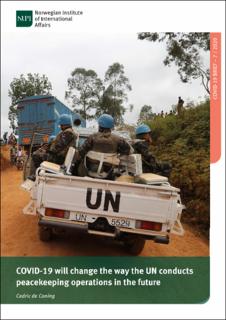| dc.contributor.author | De Coning, Cedric | |
| dc.date.accessioned | 2020-05-18T11:35:09Z | |
| dc.date.available | 2020-05-18T11:35:09Z | |
| dc.date.created | 2020-05-15T15:38:58Z | |
| dc.date.issued | 2020 | |
| dc.identifier.uri | https://hdl.handle.net/11250/2654786 | |
| dc.description.abstract | The COVID-19 pandemic has significantly disrupted UN peacekeeping operations. In the short-term, activities have been reduced to the most critical, rotations have been frozen, and most staff are working remotely. Most of the missions have adapted remarkably well, but even more extreme changes are likely in the medium term, as the global economic recession that will follow in the wake of the virus may force UN peace operations to drastically contract in size and scope. | |
| dc.language.iso | eng | en_US |
| dc.publisher | NUPI | en_US |
| dc.relation.ispartof | NUPI Covid-19 Brief | |
| dc.relation.ispartofseries | NUPI Covid-19 Brief;7/2019 | |
| dc.rights | Navngivelse-Ikkekommersiell 4.0 Internasjonal | * |
| dc.rights.uri | http://creativecommons.org/licenses/by-nc/4.0/deed.no | * |
| dc.subject | Pandemi | |
| dc.subject | Pandemic | |
| dc.subject | Afrika | |
| dc.subject | Africa | |
| dc.title | COVID-19 will change the way the UN conducts peacekeeping operations in the future | en_US |
| dc.type | Research report | en_US |
| dc.description.version | publishedVersion | |
| dc.subject.nsi | VDP::Internasjonal politikk: 243 | |
| dc.subject.nsi | VDP::International politics: 243 | |
| dc.source.pagenumber | 5 | en_US |
| dc.source.volume | 2020 | en_US |
| dc.source.issue | 7 | en_US |
| dc.identifier.cristin | 1811254 | |
| dc.relation.project | Norges forskningsråd: 304516 | en_US |
| cristin.ispublished | true | |
| cristin.fulltext | original | |

